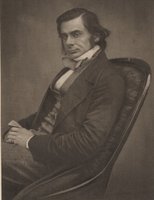Huxley, Thomas Henry

Biography
Thomas Henry Huxley (1825-1895) was highly influential in convincing both the public and the scientific community that Charles Darwin’s theory of evolution by natural selection was correct. Unlike Darwin, Huxley was born to a poor family and had only two years of schooling as a child. As a teenager, he apprenticed to a druggist and spent much of his time delivering medicines in the slums of London, seeing disease, malnutrition and suffering on a daily basis. Educating himself, he won a scholarship to a medical school in London, where he began his studies in animal physiology. While Darwin was invited to be the gentlemanly ship’s naturalist on the Beagle, Huxley joined the Navy to pay off debts and voyaged on the H.M.S. Rattlesnake as assistant surgeon. The four-year voyage (1846–1850), mostly to Australia and New Guinea, gave him plenty of time to continue his work on animal anatomy, studying jellyfish and other species of sea life. During the voyage, he prepared several papers, which he mailed to scientific societies for publication. While on leave in the young city of Sydney, he met and was soon engaged to Nettie Heathhorn, a brewer’s daughter. They agreed that he should be financially secure back in England before they wed.
Upon returning to England, Huxley found that his papers were well received and the Navy allowed him time to complete his research and prepare more papers. Most scientists at the time, like Darwin, were wealthy and needed no pay for their work, but Huxley did not have that luxury. After several years of scrambling for an income, he was employed to give lectures at several institutions in London. Five years after the Rattlesnake returned to England and eight years after he and Nettie became engaged, he wrote her that he could support them above a poverty lifestyle and she sailed to England for their wedding. Thus began a long and happy marriage.
Huxley’s studies of comparative anatomy continued and he earned respect as a superb scientist. In 1859, Darwin’s Origin of Species was published and Huxley was a leader in the ensuing debate, both public and scientific, over whether nature is controlled by natural laws or by the whims of a divine being. Also upsetting to many was the idea that humans are part of nature, rather that above it. Where Darwin avoided public debate, Huxley reveled in it and he is often referred to as “Darwin’s Bulldog.” Though it would be years before Huxley agreed with the details of Darwin’s theory, he knew that it was an important contribution to science and to how people viewed their place in nature. Huxley took his skills in animal physiology and turned to the young field of paleontology to see what he could learn about evolution from the fossil record. He was the first to see the evolutionary connection between reptiles and birds, for example, and was an early investigator of the evolution of humans and apes.
Tom Huxley not only had exceptional abilities as a scientist, he also was a brilliant communicator, both in print and on the lecture stage. His writing, whether for scientific journals or popular magazines, remains a prime example of clear, forceful prose. He gave lectures to scientific societies, college students, and the public. Huxley’s “Workingman’s Lectures,” introducing science to the working class, typically were standing room only.
Many facets of science in England changed during Huxley’s career, and he spearheaded many of the changes. Science became a profession where a salary could be earned, rather than a gentlemanly pursuit. Science became an integral part of education, which beforehand was dominated by studies of the Greek and Roman Classics. He helped introduce laboratory experimentation as part of science education, as well. Huxley also sought to make a university education more available to the poor and to women.
Huxley was a leading force in the changing religious ideas of the time. His early debates in favor of Darwin’s Origin of Species were often religiously based, revolving around the controversy of whether or not the Bible is to be interpreted as literally true or as metaphor. Later, Huxley argued the position of agnosticism, stating that there was not enough evidence to prove anything about the Bible, so a skeptical attitude was appropriate. In fact, Huxley invented the word ‘agnostic’: while the Second Century Gnostics claimed to have received their knowledge divinely, people who must rely on second hand evidence, hence a-gnostic, can never be sure of their convictions. While atheists often used the Origin of Species to attack the Church, Huxley felt that their position was just as untenable as that of the Biblical purists. By the end of Huxley’s life near the end of the Nineteenth Century, this position was much less radical than it had been several decades earlier.
Darwin and Huxley were friends who changed both science and the way people comprehend their place in nature. Darwin was a wealthy naturalist who could spend years on a study and Huxley was always scrambling to make enough money to pay the bills and trying to accomplish five things at once. Darwin avoided the public eye and Huxley loved it. Darwin introduced the dominating theory of biology and Huxley made sure that both scientists and lay people could understand it and accept it. Both were revered by the scientific community and by much of the public.
(Note: this biography was originally published in Focus on Geography, v. 47, no. 4 (2004), p. 34-36. and is reprinted here with permission of the American Geographical Society.)
Further Reading
- Desmond, Adrian, 1994, Huxley: From Devil’s Disciple to Evolution’s High Priest, Reading, Massachusetts: Addison Wesley, 820 p